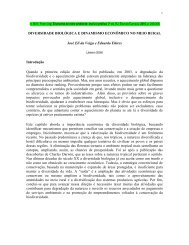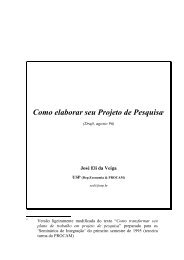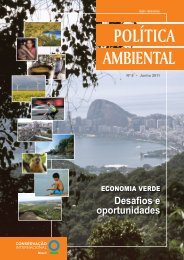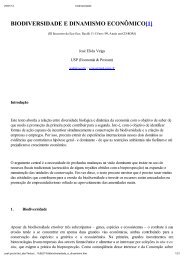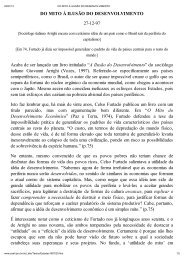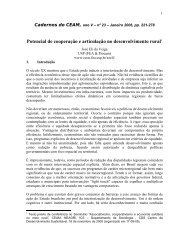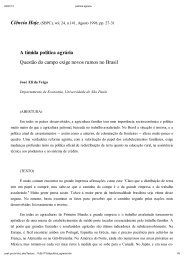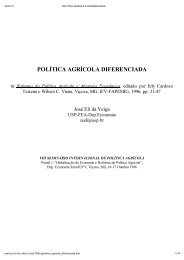sustainable development 20 years on from the ... - José Eli da Veiga
sustainable development 20 years on from the ... - José Eli da Veiga
sustainable development 20 years on from the ... - José Eli da Veiga
Create successful ePaper yourself
Turn your PDF publications into a flip-book with our unique Google optimized e-Paper software.
44<br />
One of <strong>the</strong> greatest health risks in urban areas comes <strong>from</strong> atmospheric polluti<strong>on</strong>. In some highrisk<br />
cities (such as Mexico City, São Paulo and Santiago) <strong>the</strong> emissi<strong>on</strong> of pollutants is managed to some<br />
extent. But <strong>the</strong> growth of many o<strong>the</strong>r cities has been accompanied by an increase in both stati<strong>on</strong>ary and<br />
mobile sources of pollutants and this has significantly affected health indicators in <strong>the</strong> respective<br />
populati<strong>on</strong>s. PAHO estimates that close to 100 milli<strong>on</strong> of <strong>the</strong> regi<strong>on</strong>’s inhabitants are exposed in <strong>the</strong>ir<br />
<strong>da</strong>ily lives to c<strong>on</strong>centrati<strong>on</strong>s of ambient air pollutants in excess of <strong>the</strong> maximum permissible levels<br />
established in <strong>the</strong> air quality guidelines published by <strong>the</strong> World Health Organizati<strong>on</strong>. It is calculated that,<br />
annually, air polluti<strong>on</strong> costs <strong>the</strong> lives of around 35,000 people and <strong>the</strong> loss of 276,000 life <str<strong>on</strong>g>years</str<strong>on</strong>g> (Romieu<br />
and o<strong>the</strong>rs, <str<strong>on</strong>g>20</str<strong>on</strong>g>10).<br />
(e)<br />
Reducing health risks <strong>from</strong> envir<strong>on</strong>mental polluti<strong>on</strong> and hazards<br />
In additi<strong>on</strong> to air polluti<strong>on</strong>, chemical c<strong>on</strong>taminati<strong>on</strong> is a serious problem in <strong>the</strong> regi<strong>on</strong>. Chapter II<br />
discusses progress made in managing chemical products. Some of <strong>the</strong> main health problems are caused by<br />
<strong>the</strong> use of dichlorodiphenyltrichloroethane (DDT) and by chemical and technological incidents. DDT has<br />
also comm<strong>on</strong>ly been used to c<strong>on</strong>trol malaria. Between <str<strong>on</strong>g>20</str<strong>on</strong>g>04 and <str<strong>on</strong>g>20</str<strong>on</strong>g>07 an innovative scheme was carried<br />
out to combat malaria without <strong>the</strong> use of toxic insecticides —and eliminating DDT— in <strong>the</strong> countries of<br />
Central America and Mexico with support <strong>from</strong> PAHO, <strong>the</strong> Nati<strong>on</strong>al Public Health Institute of Mexico<br />
and <strong>the</strong> Global Envir<strong>on</strong>ment Facility. This scheme reduced malaria transmissi<strong>on</strong> by 63% in <strong>the</strong><br />
participating communities and eradicated <strong>the</strong> use of persistent organic pollutants —and <strong>the</strong>refore <strong>the</strong>ir<br />
effects <strong>on</strong> ecosystems (PAHO, <str<strong>on</strong>g>20</str<strong>on</strong>g>08b). Even so, preventive measures and risk minimizati<strong>on</strong> efforts have<br />
been insufficient. As a subregi<strong>on</strong>, Central America has historically been <strong>on</strong>e of <strong>the</strong> world’s greatest<br />
importers of insecticides (Bravo and o<strong>the</strong>rs, <str<strong>on</strong>g>20</str<strong>on</strong>g>11).<br />
Chemical and technological incidents are not isolated events in Latin America and <strong>the</strong> Caribbean.<br />
Some have caused major human health impacts, such as <strong>the</strong> gasoline spill in <strong>the</strong> sewer system of<br />
Gua<strong>da</strong>lajara (Mexico) in 1992 and <strong>the</strong> chemical spill in <strong>the</strong> port of La Guaira (Bolivarian Republic of<br />
Venezuela) in 1999 (Had<strong>da</strong>d, Aguilar and Nobre Gouveia, <str<strong>on</strong>g>20</str<strong>on</strong>g>10).<br />
(f)<br />
Emerging health issues<br />
The regi<strong>on</strong> is undergoing an epidemiological transiti<strong>on</strong> (see figure I.12): <strong>on</strong> <strong>the</strong> <strong>on</strong>e hand, l<strong>on</strong>gstanding<br />
risks have not been adequately reduced while, <strong>on</strong> <strong>the</strong> o<strong>the</strong>r, newer problems are <strong>on</strong> <strong>the</strong> rise,<br />
including tobacco addicti<strong>on</strong>, alcoholism, physical inactivity and poor diet, uncoordinated public transport,<br />
un<str<strong>on</strong>g>sustainable</str<strong>on</strong>g> agriculture, uneven socioec<strong>on</strong>omic <str<strong>on</strong>g>development</str<strong>on</strong>g> and envir<strong>on</strong>ments which discourage<br />
healthy behaviours. Ano<strong>the</strong>r issue that has gained importance in recent <str<strong>on</strong>g>years</str<strong>on</strong>g> is <strong>the</strong> impact of climate<br />
change <strong>on</strong> health. This is discussed in chapter II. O<strong>the</strong>r global envir<strong>on</strong>mental changes that raise health<br />
c<strong>on</strong>cerns for <strong>the</strong> regi<strong>on</strong> are loss or deteriorati<strong>on</strong> of ecosystems and <strong>the</strong> degra<strong>da</strong>ti<strong>on</strong> of water sources<br />
caused by envir<strong>on</strong>mental exploitati<strong>on</strong> and worsened by climate change. Land-use change, for example,<br />
may lead to malnutriti<strong>on</strong> in local populati<strong>on</strong>s; biodiversity loss can result in changes in <strong>the</strong> natural<br />
regulati<strong>on</strong> of some infectious diseases; and water shortage has direct health implicati<strong>on</strong>s where people use<br />
polluted water and indirect effects where it is lacking for local agricultural use (WHO, <str<strong>on</strong>g>20</str<strong>on</strong>g>05).



